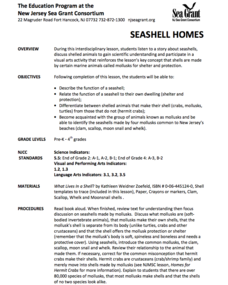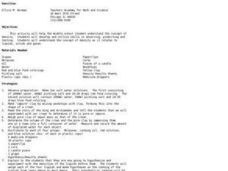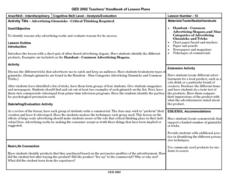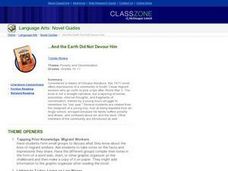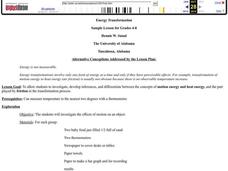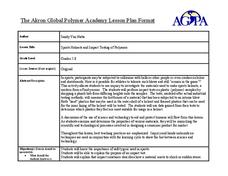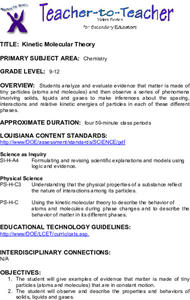Curated OER
And You Thought Gasoline Was Expensive!
Students carry out a cost analysis. For this comparative math lesson, students compare the cost of equal measures of gasoline to mouthwash, house paint, fruit juice, white-out, and other liquids.
Curated OER
Compared to What? Comparing the Density of Different Liquids
Students work in groups to compare the density of different liquids. For this density lesson, students use cooking oil, liquid detergent and water to measure density. Students record their results and check the accuracy of their...
Curated OER
Seashell Homes
Pupils listen to a story about seashells. They discuss shelled animals. Learners describe the function of seashell. Pupils relate the function of a seashell to their own dwelling. They differentiate between shelled animals that make...
Curated OER
Can You See the Light?
Students investigate the transmission of light energy. For this light energy lesson, students observe bubbles using different colored filters and record their observations. They also look at a light source through various materials and...
Curated OER
Densities
Students explore the concept of density. In this density lesson plan, students determine the density of a crown and a sample of clay. They hypothesize about the densities of 4 liquids they are given including molasses, cooking oil, a red...
Curated OER
Who Works for Nonprofit Organizations? (6-8)
Students explore career opportunities in the nonprofit sector. In this career exploration instructional activity, students listen to guest speakers who work for nonprofit organizations explain their jobs. Students also examine the role...
Curated OER
Letters from the Heart: Designing for the Other 90% of the World's Population
Students explore varied aspects of the design process and learn that most products are designed to reach the worlds wealthiest 10%. In this lesson, students work in groups to learn ways in which designers are attempting to rectify this...
Curated OER
Culture and Obesity
Students explore cultural perceptions regarding obesity. For this personal health lesson, students read case scenarios about 3 women and their health perceptions. Students discuss the women and the stereotypes associated with the women...
Curated OER
Catalase and Catalysis
Learners explore enzyme catalysis through a series of experiments. In this chemistry lesson plan, students determine the factors affecting catalysis. They explain the different uses of this process.
Curated OER
Spiders Catch Prey
Students see that spiders catch and eat their prey and are also caught and eaten by their enemies. They sort the pictures into animals that spiders eat, those they do not eat, and those that are spiders.
Curated OER
Advertising Gimmicks - Critical Thinking Required
Students identify reasons why advertising works, evaluate reasons for its success, and write commercials.
Curated OER
Phytoplankton and Ocean Color
Fifth graders identify function of phytoplankton in the biospere by conducting experiments and simulations and reading for information. They detect the presence of phytoplankton in bodies of water by examining ocean in satellite images...
Curated OER
Fit For Life: Eat Smart and Exercise
Students examine the problem of obesity among teenagers. They view a video and discuss what could be done to avoid becoming overweight. They also explore the importance of exercise.
Curated OER
...And the Earth Did Not Devour Him
Students examine impressions of a community of migrant workers in Texas who go north to pick crops. The instructional activity highlights the poverty and discrimination that a family suffers in the 1970's.
Curated OER
Energy Transformation
Students experiment with variety of materials to investigate, develop inferences, and differentiate between concepts of motion energy and heat energy, and the part played by friction in the transformation process.
Curated OER
Paws in Jobland: Aspects of Working Life
Students discover concepts related to working conditions and practices. In this career lesson plan, students research information pertaining to specific jobs and then present it to their peers.
Curated OER
Sports Helmets and Impact Testing of Polymers
Students examine the importance of good quality safety gear. In this investigative instructional activity, students will tests various polymers, collect data, and analyze the data to determine which polymer is best for safety helmets....
Curated OER
Kinetic Molecular Theory
High schoolers analyze and evaluate evidence that matter is made of tiny particles. They observe a series of phenomena involving solids, liquids, and gases to make inferences about the spacing, interactions and relative kinetic energies...
Curated OER
Diverse Voices -African American Ventures
Young scholars explore acts of kindness through the eyes of the black community. In this philanthropy lesson, students understand that even under inhumane circumstances, people can perform for the common good. Young scholars relate to...
Curated OER
Diagnosing Delusions
Students see how widespread medical myths can be potentially dangerous. They synthesize their knowledge by creating pamphlets that help patients learn the facts behind some commonly believed medical myths.
Curated OER
Beans and Birds: A Natural Selection Simulation
Young scholars solve the following problem concerning the evolution of seed color in pinto bean plants: "How does natural selection change the frequency of genes or traits over many generations?" They use the constructivist approach to...
Curated OER
Keeping Warm
Fifth graders measure the temperature of water using a thermometer. They record the temperatures of water on a chart. Students use the temperature data to determine which materials are the best conductors of heat. They discuss their...
Curated OER
Your Beating Heart - Circulatory System
Students illustrate a schematic circulatory system of a human body including heart, lungs, arteries, veins and capillaries. Next, students conduct an experiment to increase understanding of the relationship between heart rate/pulse and...
Curated OER
Connection to the Past
Students learn basic interviewing and biography writing skills. They first identify a senior citizen in their community who remembers the Great Depression.




